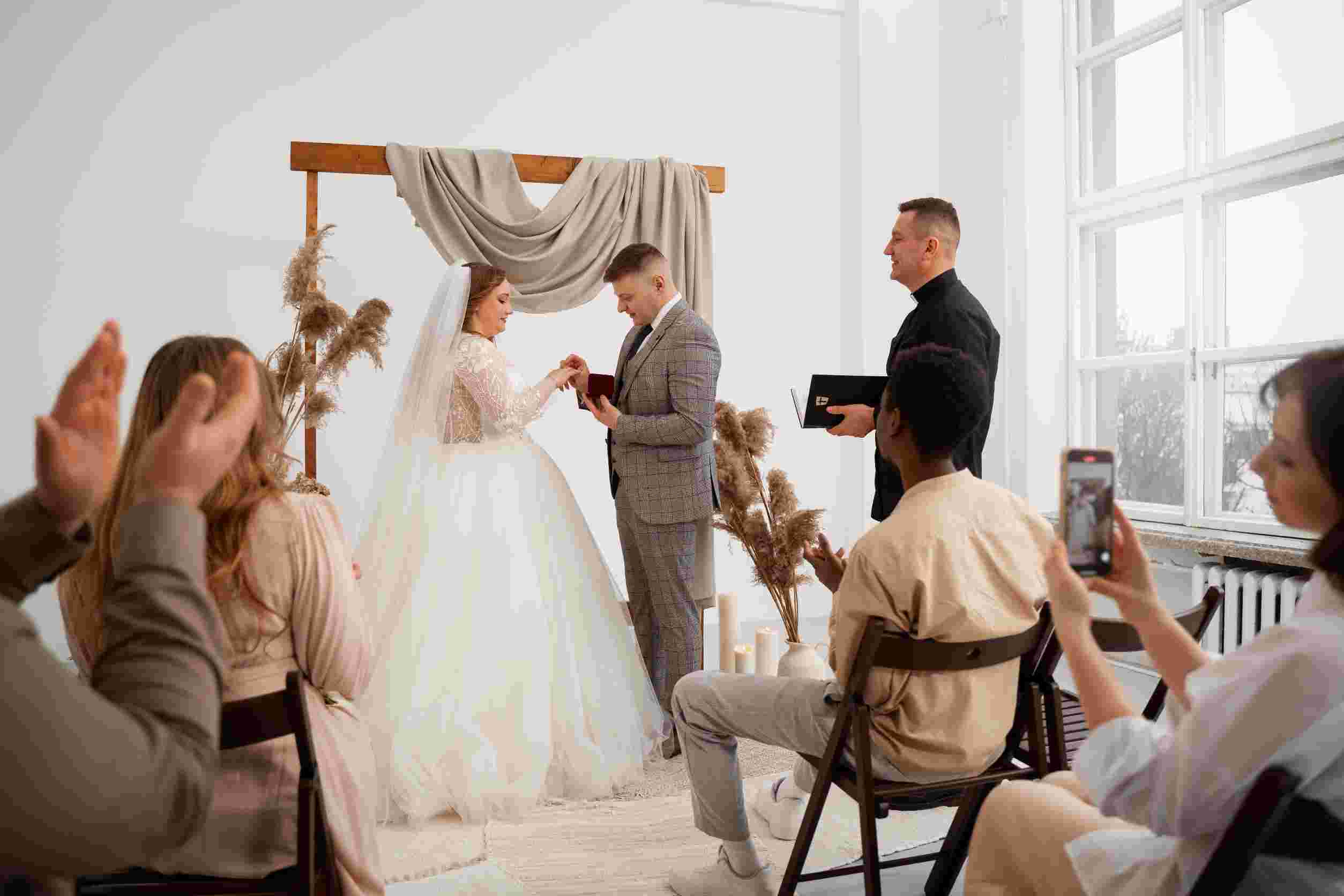all faith ministry
March 10, 2025

A wedding is one of the most memorable days in a couple’s life. It is a time to celebrate love, commitment, and the start of a new chapter together. While many elements contribute to a beautiful ceremony, one of the most important roles is that of the wedding officiant.
The officiant is responsible for leading the ceremony, guiding the couple through their vows, and ensuring the legal aspects of the marriage are properly handled. Their presence and words set the tone for the event, making it a meaningful experience for the couple and their guests.
Choosing the right wedding ceremony officiant is an essential step in planning a ceremony that feels personal and memorable. The officiant’s role goes beyond reading vows—they create an experience that reflects the couple’s unique journey.
Let’s explore the role of an officiant in creating lasting memories.
The wedding officiant is the first person to speak during the ceremony. Their voice, energy, and words create the atmosphere for the entire event. Whether it is a formal, lighthearted, or deeply personal ceremony, the officiant’s delivery shapes how guests experience the moment.
By understanding the couple’s vision, the officiant ensures that the ceremony reflects their personalities and relationships. This makes the event feel authentic and memorable.
A good officiant does not follow a one-size-fits-all approach. Instead, they take the time to learn about the couple—their journey, values, and what makes their relationship unique.
They may include personal stories, meaningful readings, or special rituals that reflect the couple’s cultural or religious background. This personalization makes the ceremony unique and ensures it resonates with the couple and their loved ones.
Planning a wedding can be overwhelming, especially for couples unfamiliar with the ceremony structure. The officiant helps simplify this process by explaining what to expect, offering guidance on vow writing, and helping them feel comfortable leading up to the big day.
During the ceremony, they provide clear instructions, ensuring everything flows smoothly. For those interested in taking on this important role, many resources are available to become a wedding officiant and learn how to create meaningful ceremonies.
One of the key responsibilities of a wedding officiant is making sure the marriage is legally recognized. This includes:
By handling these details, the officiant ensures the couple can focus on celebrating their marriage without concerns about legal formalities.
The vow exchange is one of a wedding ceremony’s most emotional and significant parts. The officiant plays a crucial role in facilitating this moment by:
Their ability to create a comfortable space for this exchange allows the couple to express their love and commitment sincerely.
Weddings are live events, and unexpected things can happen—weather changes, nervous couples, or minor delays. An experienced officiant stays calm and adaptable, ensuring that challenges are managed gracefully.
They may adjust their speaking pace, reassure a nervous bride or groom, or improvise if something does not go as planned.
A wedding ceremony is not just for the couple—it is also an experience for the guests. A skilled officiant keeps everyone engaged by making the ceremony interactive, using a warm and inviting tone, and incorporating moments that involve family and friends.
This can include special readings, group blessings, or interactive rituals that encourage participation. When guests feel connected to the ceremony, it creates a shared, memorable experience for everyone.
The words spoken during a wedding ceremony stay with the couple for years. A meaningful message about love, partnership, and commitment can inspire and serve as a reminder of the promises made on that special day.
An officiant’s ability to deliver heartfelt words ensures that the ceremony is not just an event but a cherished memory that the couple and their guests will hold onto forever.
For those looking to improve their skills and knowledge, wedding officiant training can help develop the confidence and expertise needed to create memorable ceremonies.
A wedding officiant does more than just lead a ceremony—they create an experience that reflects the couple’s love and commitment. Through careful preparation, personalization, and thoughtful delivery, they ensure the wedding is meaningful and legally sound.
For couples in USA, finding the right officiant is essential in planning a memorable ceremony. For those who feel inspired to take on this role, resources such as officiant training can provide the necessary skills and knowledge to perform ceremonies with confidence.
If you are looking for a dedicated and professional officiant or want to become one yourself, all faith ministry offers guidance and services to help make wedding ceremonies memorable.
Reach out to us for more details and personalized assistance. Our team is here to answer your questions and provide the information you need. Contact us today to learn more!
all faith ministry – We Ordain
Copyright © 2024. All rights reserved.